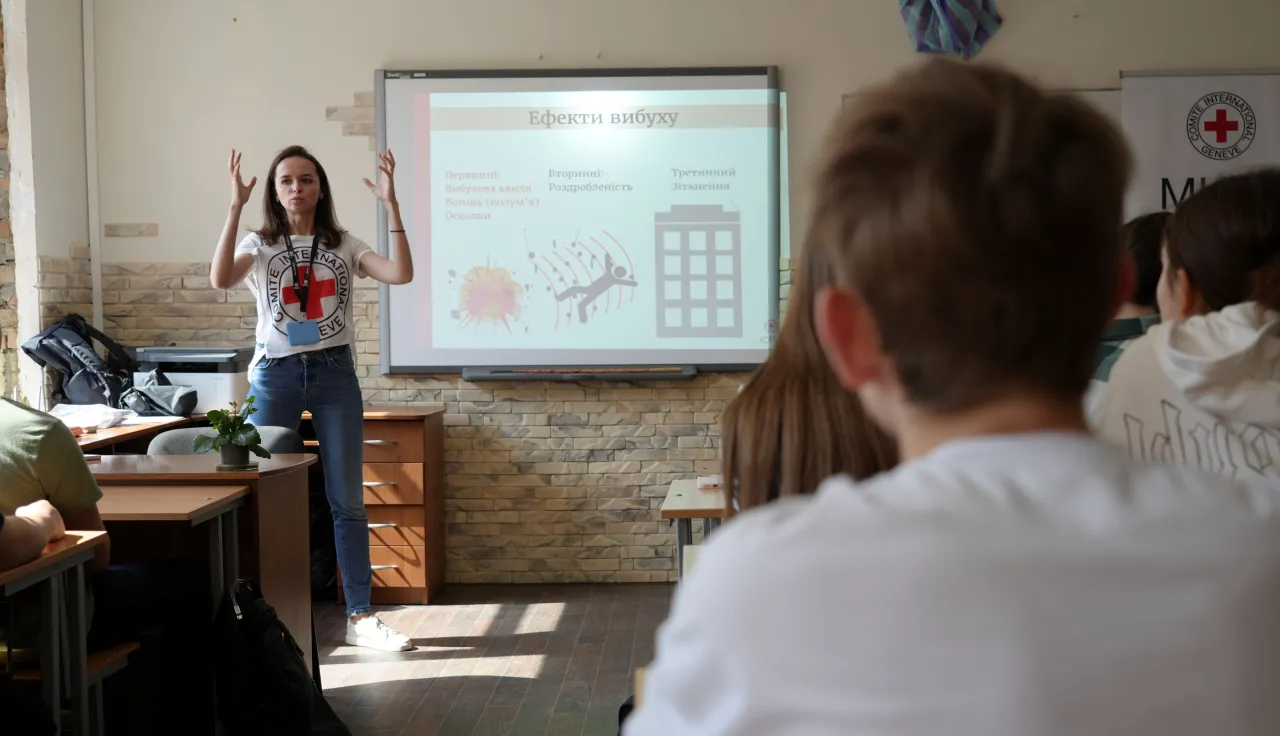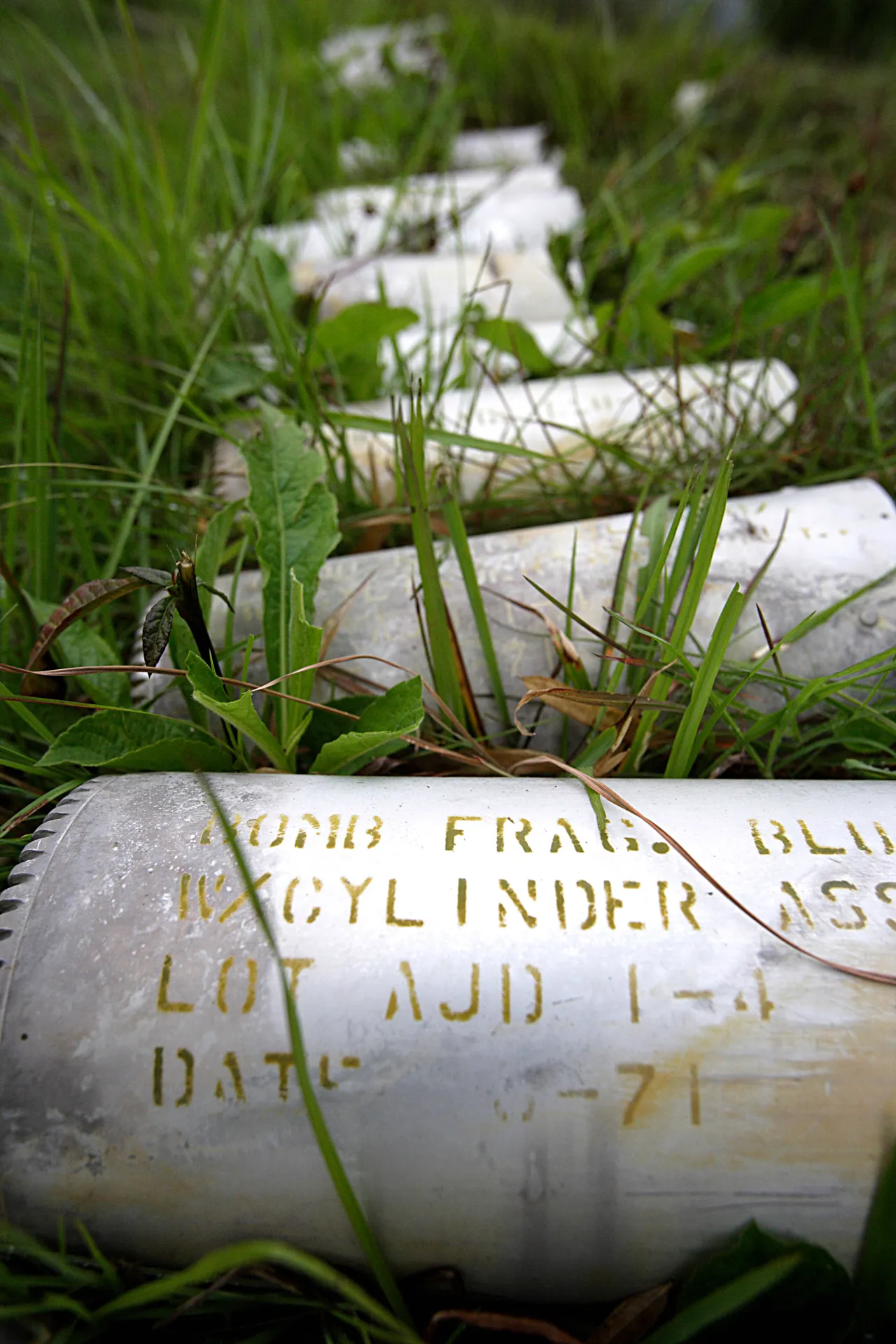Reneging on cluster munitions ban endangers civilian lives and erodes IHL

The International Committee of the Red Cross deeply regrets Lithuania’s unprecedented withdrawal from the Convention on Cluster Munitions, effective 6 March 2025. In conflict zones, cluster munitions kill and injure civilians and damage homes, hospitals and schools. They also leave behind a deadly legacy of unexploded submunitions. The reintroduction of cluster munitions into any military's arsenal risks aggravating this threat. Withdrawing from any international humanitarian law (IHL) treaty erodes live-saving humanitarian protections in war and tears at the fabric of international law.
Cluster munitions cause unacceptable harm. They scatter huge numbers of explosive submunitions across several thousand square metres, with many striking well outside the intended target area. In addition, submunitions often fail to detonate, contaminating urban neighbourhoods, forests and fields with deadly unexploded ordnance.
In nearly every context where cluster munitions have been used over the past decades – from Afghanistan to Yemen and from Laos to Lebanon – they have taken a heavy toll on civilians, both during the fighting and after military operations have ended. The presence of explosive cluster munition remnants poses a grave threat to everyone, from city dwellers sorting through the rubble of destroyed homes to shepherds tending to their flocks. It prevents displaced families from safely returning home, impedes access to hospitals and schools, and hinders the reconstruction of vital infrastructure such as roads, water pumps and power plants.
Children are especially vulnerable to unexploded submunitions. These small devices are sometimes painted in vivid colours and equipped with a ribbon, making them tempting to play with, but they can detonate at the slightest disturbance, cutting young lives short. Those who survive face a long journey to recovery. Some may never walk again. According to the latest Cluster Munition Monitor, “[c]hildren accounted for almost half (47%) of all casualties from cluster munition remnants in 2023”.
Clearing unexploded submunitions is difficult and dangerous. Every year, people working to remove the threat posed by these hair-trigger devices are killed or maimed. It often takes years, even decades, to make communities safe again. Bosnia-Herzegovina only officially declared itself free from cluster munitions two years ago, nearly 30 years after the Bosnian war came to an end. Civilians are still paying a heavy price today as cluster munitions continue to be used, including in the Russian-Ukraine armed conflict.
To put an end to the suffering and casualties caused by these terrible weapons once and for all, 124 states have signed up to the Convention on Cluster Munitions and over 110 remain bound by it today. The convention, which was adopted in 2008, prohibits the use, stockpiling, production and transfer of cluster munitions. This landmark humanitarian treaty has helped save countless lives. States parties have destroyed over a million stockpiled cluster munitions and cleared vast swathes of land, which can then be safely returned to communities for productive use.
The ICRC and the wider Red Cross and Red Crescent Movement have long supported the ban on cluster munitions. Red Cross and Red Crescent volunteers and staff members have witnessed the horrific effects of these weapons first hand while working to prevent accidents and assist survivors.
Lithuania’s withdrawal from the Convention on Cluster Munitions is unprecedented. No state has ever denounced a global humanitarian treaty. The ICRC deeply regrets that Lithuania has not heeded the call issued by states parties in September 2024, urging it to reconsider its decision.
As the geopolitical context becomes increasingly challenging, the ICRC is concerned that pulling out of hard-won international agreements that limit the use of weapons that cause unacceptable harm on the grounds of national security will undermine international humanitarian law. The security situation is constantly evolving, but the appalling human cost exacted by the use of cluster munitions, anti-personnel mines and other horrendous weapons remains unchanged.
As ICRC President Mirjana Spoljaric said, “International humanitarian law is not made for the hopeful days of peacetime. It is made for humanity’s darkest days, when armed conflict rages and people are in grave danger.”
Withdrawing from any humanitarian treaty diminishes the legal protections afforded to the victims of war. It is the responsibility of all states to defend and strengthen international norms that aim to mitigate the horrors of war. To uphold humanity, even in times of armed conflict, it is incumbent on all of us to reinforce the humanitarian frameworks that keep vulnerable people safe.
The ICRC calls on states party to the Convention on Cluster Munitions to
- remain steadfast in their determination to work towards a world free of cluster munitions and honour their commitment to condemn the use of cluster munitions by any party.
and on all states to:
- not withdraw from or circumvent the Convention on Cluster Munitions or any humanitarian treaty, but instead accelerate their universalization.
- publicly reaffirm the value of humanitarian restrictions in war and take positive steps to strengthen respect for IHL.
- raise public awareness of how disarmament and IHL can save lives, and foster understanding of the risks of undermining the protection they provide.
About the ICRC
The International Committee of the Red Cross (ICRC) is a neutral, impartial and independent organization with an exclusively humanitarian mandate that stems from the Geneva Conventions of 1949. It helps people around the world affected by armed conflict and other violence, doing everything it can to protect their lives and dignity and to relieve their suffering, often alongside its Red Cross and Red Crescent partners.
For more information, please contact:
Aurélie LACHANT, ICRC Geneva, tel: +41 79 731 04 03, email: alachant@icrc.org
For more information on cluster munitions from the ICRC, visit:
- Weapon contamination: Reducing risk for communities
- Physical rehabilitation: Regaining independence, improving quality of life
- ICRC Vice-President Dr Gilles Carbonnier: The international community must urgently take deliberate steps and lead towards effectively protecting civilians
- 2008 Convention on Cluster Munitions
- Five things to know about the deadly legacy of explosive remnants of war
- It is up to States Parties and the broader Convention community to defend and promote the norms of the Convention on Cluster Munitions
- In times of insecurity and conflict, states must work together to uphold and strengthen international humanitarian law
- Let us remember that disarmament saves lives, curbs arms race, moderates the inhumanity of war, and fosters peace
- Global Initiative to galvanise political commitment to international humanitarian law


